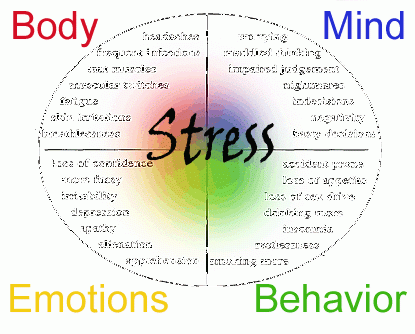30 quick Stress Facts...
- While it is a myth that stress can turn hair gray, stress can cause hair loss.
- In 2009, the top most stressful jobs were a surgeon, commercial airline pilot, photojournalist, advertising account executive, and real estate agent.
- The least stressful jobs were actuary, dietitian, astronomer, systems analyst, and software engineer.
- The top three stressful cities in America are Chicago, Ilinois; Los Angeles, California,and New York.
- Stress can make acne worse.
- Laughing lowers stress hormones (like cortisol, epinephrine, and adrenaline) and strengthens the immune system by releasing health-enhancing hormones.
- The stress hormone cortisol causes abdominal fat to accumulate.
- Stress is linked to the six leading causes of death: heart disease, cancer, lung ailments, accidents, liver cirrhosis, and suicide.
- The stress of caring for a disabled spouse increases the risk of stroke substantially.
- Chronic stress can impair the developmental growth in children by lowering the production of growth hormone from the pituitary gland.
- A 2009 CNN poll reveals that the number one reason for stress in most countries is money.
- The term “stress” derives from the Latin stringere (to draw tight).
- Stress causes capillaries to close, which restricts bleeding if a flesh wound should occur.
- Pupils dilate (mydriasis) during stress much the same way they dilate in response to attraction: to gather more visual information about a situation.
- Chronic stress floods the brain with powerful hormones that are meant for short-term emergency situations. Chronic exposure can damage, shrink, and kill brain cells.
- Scientists suggest that stress is part of the evolutionary drive because it has enabled humans to survive.
- Stress makes the blood “stickier,” in preparation for an injury.
- Research has shown that dark chocolate reduces stress hormones such as cortisol and other fight-flight hormones. Additionally, cocoa is rich in antioxidants called flavonoids.
- Chronic stress increases cytokines, which produce inflammation. Exposure to constant inflammation can damage arteries and other organs.
- Stress can alter blood sugar levels, which can cause mood swings, fatigue, hyperglycemia, and metabolic syndrome, a major risk factor for heart attack and diabetes.
- Chronic stress worsens irritable bowel syndrome (IBS), a condition that irritates the large intestine and causes constipation, cramping, and bloating.
- Peptic ulcers are caused by the H.pylori bacteria or the use of NSAIDS—not stress. However, stress can exacerbate ulcers and keep them from healing.
- Chronic stress decreases the body’s immune system’s response to infection and can affect a person’s response to immunizations.
- Studies show that HIV-infected men are more likely to progress to AIDS if they are under high stress than those with lower levels of stress.
- Stress can increase the ability of chemicals to pass the blood-brain barrier, which shields neurons from some poisons, viruses, toxins, and other fluctuations in normal blood chemistry.
- Young people from military families who have a deployed parent report higher levels of stress and emotional problems than other adolescents and teens.
- Stress increases the risk of pre-term labor and intrauterine infection.
- Post-traumatic stress physically changes children’s brains; specifically, stress shrinks the hippocampus, a part of the brain that stores and retrieves memories.
- Stress can result in more headaches as a result of the body rerouting blood flow to other parts of the body.
- Men are more likely than women to develop certain stress-related disorders, including hypertension, aggressive behavior, and abuse of alcohol and drugs.



